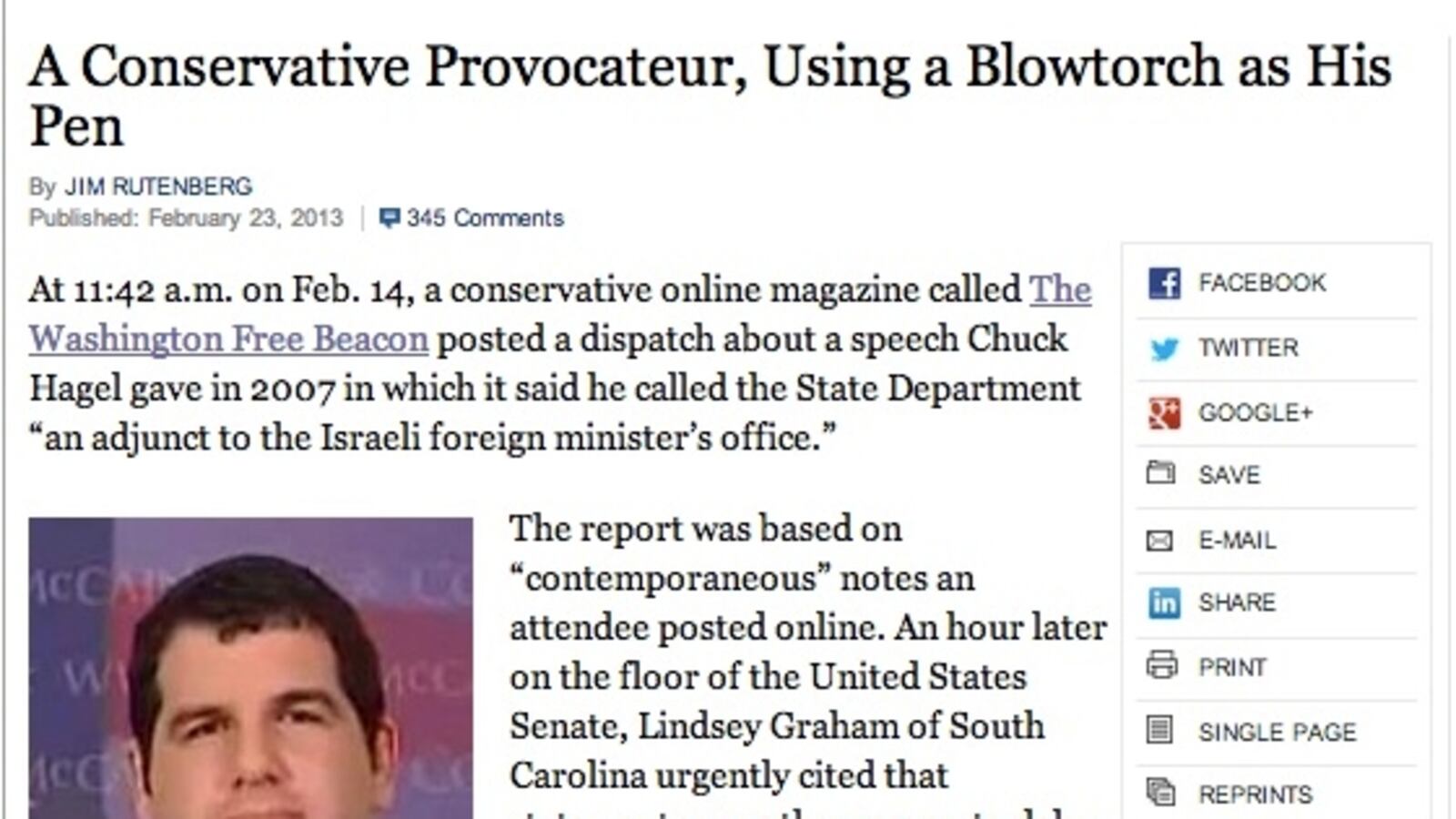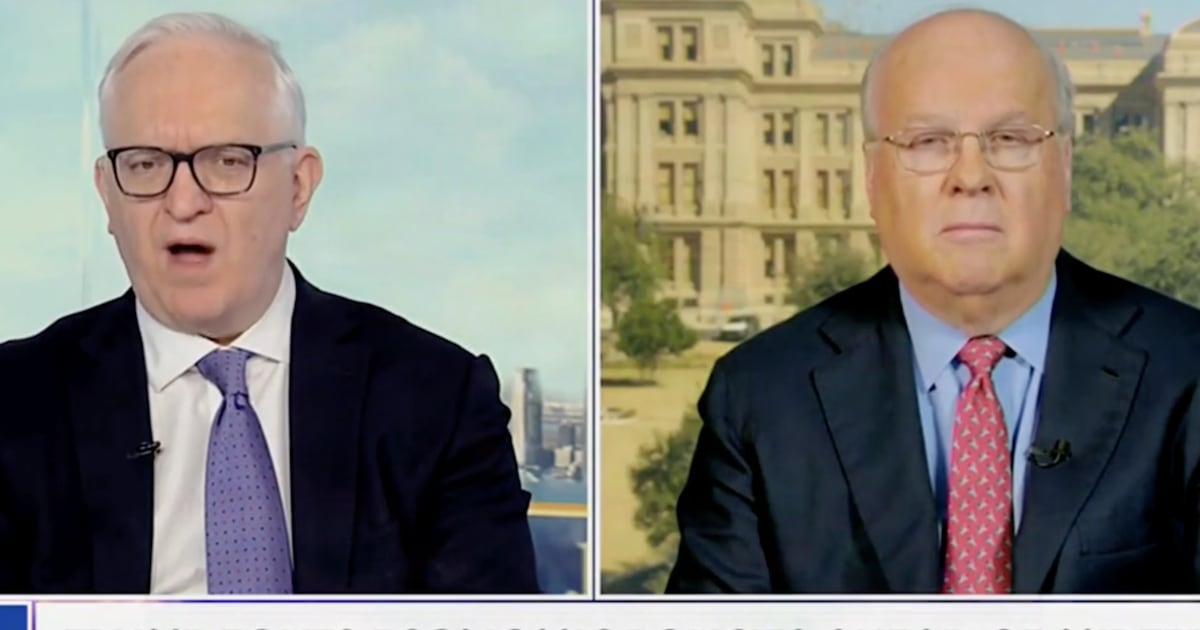Michael Goldfarb is a nice guy. We've met at least once, and chatted for a few minutes: even then his quick wit and jovial nature—that broad smile on his Twitter profile isn't merely of the circumstance—were on proud display. None of that charm came through in the front-page, Sunday New York Times profile of Goldfarb, perhaps because the pugilistic commentator and foreign lobbyist refused to meet with the Times reporter in person. Other than that, the profile does a decent job capturing Goldfarb and the way he does business, with one major omission: that he cares so little for facts or any accepted version of truth when they get in the way of his latest attack. Goldfarb plays and has played roles in some of Bill Kristol's various enterprises: the pro-Iraq-war Project for a New American Century, the Weekly Standard and, lately, the Emergency Committee for Israel (which is already pushing for an Iran war). It's no surprise, given Goldfarb and some of the other central players, that ECI gets called out again and again for "mostly false" salvos against political enemies. Goldfarb, in other words, represents Bill Kristol's worst instincts.

But Goldfarb doesn't aspire to be another Bill Kristol—let alone the right-wing don's father, the neoconservative intellectual Irving. Writing in 2011 about neoconservatives' intellectual history, Daniel Luban made a trenchant observation about Goldfarb's place in the evolution of an ideology: "If there is an emblematic member of the youngest generation of neoconservatives, the successors to William Kristol and Robert Kagan, it is the ubiquitous political flack Michael Goldfarb, former PR man for the McCain presidential campaign and member of the Palin brain trust." Luban concluded: "The neoconservative hold on mainstream conservatism appears firm, at least in the short term, but will anyone write intellectual histories of neoconservatism’s development from this point forward? At the moment it seems doubtful. The movement has an interesting past, but it is unlikely to have an interesting future." Yet Goldfarb, largely due to his flame-throwing anti-intellectualism, is anything but boring.
There was, in the Times profile, a stunning admission from Goldfarb. The Times' Jim Rutenberg got Goldfarb to comment on a story in the right-wing Free Beacon, whose parent Goldfarb chairs, about a reshuffled masthead at the New Republic. The headline in the Beacon read "Hughes Drops Jews"—a reference to new TNR owner Chris Hughes—and its clear implications were captured nicely by former TNR staffer Jonathan Chait at New York: "Hitler Alive and Well, Owning Liberal Magazine." What was the deal with this rather stunning accusation—presented without a byline—of anti-Semitism at the vaunted magazine? Just a joke, it turns out: "We’re true believers, but we’re also troublemakers, and if you look at the work we do, a lot of it has a sense of humor," Goldfarb told Rutenberg. So even while attacking Chuck Hagel as anti-Semitic on the basis of a few impolitic comments about the undoubtably real influence of pro-Israel organizations in Congress—of a piece with attacks from around the Kristol empire—Goldfarb concedes here that his group's accusations of anti-Semitism are just for laughs. (Abe Foxman is notoriously humorless on these matters; one wonders if the Beacon is in line for a letter from the ADL.) Honest? No. Intellectually sound? No. Attention-grabbing? Definitely.
Then there's Goldfarb's apparent views on killing children. During Israel's brief 2008 to 2009 war with Hamas, Goldfarb wrote of an upside to an Israeli strike that killed a Hamas leader's 12 children: "To wipe out a man's entire family, it's hard to imagine that doesn't give his colleagues at least a moment's pause." When ECI board member Rachel Abrams blogged a genocidal screed against Palestinians in Gaza, Goldfarb defended her by telling press that critics were "accusing her of directing her words at all Palestinians when she was clearly speaking about the terrorists." Of course, Goldfarb ignored that Abrams also called for sending the children of Palestinian terrorists—referred to in the item as "devils’ spawn"—to become "food for sharks." (Responding to a joke from Goldfarb, Abrams, presumably joking herself—see a pattern here?—said she had the same fate in mind for this writer.) Has there ever been a clearer example of the moral taboo of visiting the sins of the father on the child?
His omission of the breadth of Abrams's blogpost hints at Goldfarb's most salient feature: that he goes after his targets with all the zeal of the ideologues with whom he's associated—which is to say with no fealty whatsoever to facts or basic standards of journalistic integrity. Take the recent example of Goldfarb tweeting that the left-wing anti-war Code Pink was funded by the anti-nuclear group Ploughshares (full disclosure: my former employer, the Center for American Progress, received funding from Ploughshares). It took only a few minutes for the JTA's Ron Kampeas to find that the allegation was completely false, and that Goldfarb had plucked his conspiracy theory—meant as an attack on the latest neocon bête noire and Ploughsares adviser, Chuck Hagel—from "a couple of conservative researchers who target the left made the connection: Aaron Klein here, Discover the Networks, here." Klein works for WND, a cite best known for relentlessly peddling the theory that Barack Obama is not American and a secret Muslim, and Discover the Networks is a project of David Horowitz, known these days mostly for his anti-Islam views. That's not exactly great company. Perhaps that's why Goldfarb didn't comment any further on his yarn.
It is precisely Goldfarb's history of playing fast and loose with facts—a modus operandi on stark display in the Hagel flap, where Goldfarb and his colleagues threw whatever they could, no matter the merits, at Hagel just to see what'd stick—that makes him so dangerous for journalists. And so the kicker of Rutenberg's story quotes BuzzFeed editor Ben Smith saying: "There’s something to be said for stabbing people in the front in a town where everybody goes around all day stabbing each other in the back." One would think a fine journalist like Smith might note that there's something to be said for not stabbing people at all on the basis of unfounded rumors, the worst kinds of innuendo, and outright lies. The conservative Washington Examiner, after the Chuck Hagel/"Friends of Hamas" flap, recently ran a thoughtful item critical of fellow conservatives for not hewing to journalistic best practices. It'd be nice if either the Times or Smith had noted that Goldfarb, in both his lobbying and journalism, embodies this failure. This is what neoconservatism has become; even a critic can lament.






